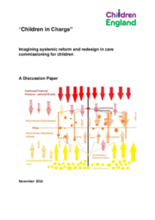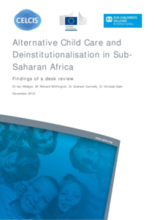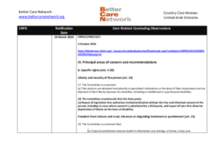Displaying 391 - 400 of 660
This paper is an attempt at rethinking the systemic problems facing the funding and commissioning of care services and placements for children in need of care and adoption, across ALL types and specialisms of placement, from kinship care, through foster care, to residential care and adoption.
This desk review provides a brief mapping and summary of existing knowledge on alternative care and deinstitutionalisation in Africa.
This study attempts to understand the feelings and bonds of the often complex life situations of being an internationally adopted child.
This country care review includes the care-related Concluding Observations adopted by the Committee on the Rights of Persons with Disabilities during the sixteenth session (15 Aug 2016 – 2 Sept 2016) of the Convention on the Rights of Persons with Disabilities.
By drawing on an empirical study on placing disabled children for adoption, the article seeks to demonstrate the practical application of critical realist by combining its Retroductive framework with Grounded Theory methods.
Kathryn Joyce discusses the issues that one mother in Uganda faced when she put her child up for international adoption.
This tip sheet from Capacity Building for the States provides best practice intake screening questions for unregulated custody transfer/re-homing (UCT) of adopted children.
This study examines the link between Rejection Sensitivity (RS), Attachment Pattern (AP) and Socio-Emotional Adjustment (SA & EA) among adolescent's living in orphanages and those living with their parents. Adolescents (N=360) ranging between 14–18 years completed self-report measures. The findings suggest that there exists significantly positive and negative correlation as well as significant interaction between gender and living conditions among the variables RS, AP, SA and EA.
This country care review includes the care-related Concluding Observations adopted by the Committee on the Rights of the Child.
This paper analyzes the concluding sections of assessment reports on applicants for intercountry adoption in Sweden to answer the following question: what must be said about an individual or a couple in order for her/them to be seen as a suitable adoptive parent?





